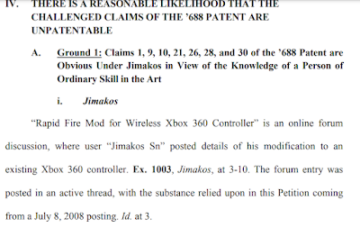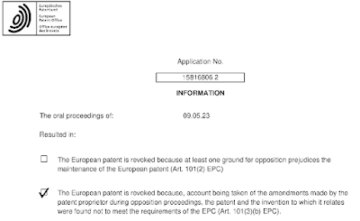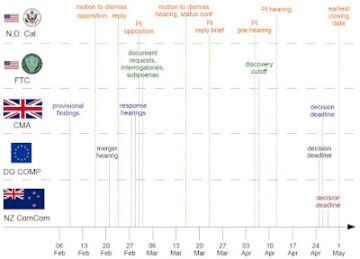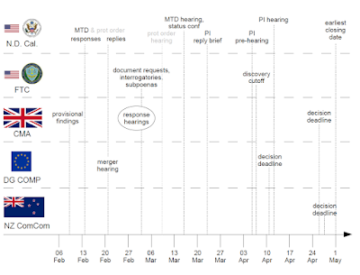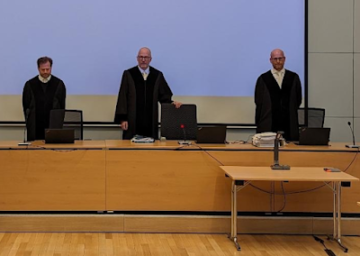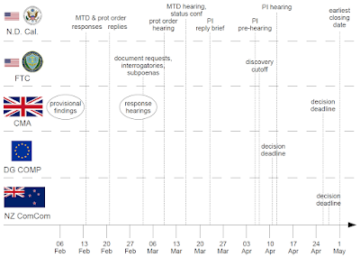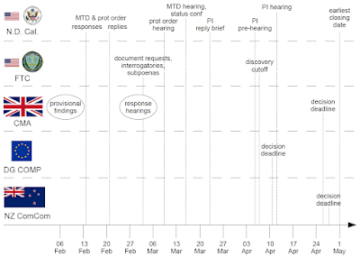The Warsaw conference on standard-essential patents (SEPs) that I blogged about last month started yesterday and will end in a few hours. Apart from audio quality, it was probably the best event so far at which the proposed EU SEP Regulation was discussed.
If there ever had been any doubt that something was fundamentally wrong with the process and the mindset that brought about the proposal in question, it would have been eliminated by some of what was said at that conference. I can only hope that EU policy makers are going to realize now that no matter whether one might want to put a thumb on the scales of SEP licensing and enforcement for one side or the other, the proposal that is currently on the table cannot possibly serve as the basis for a co-legislative process that is not equipped to fundamentally restructure an ill-conceived proposal. The only reasonable thing to do would be to withdraw it and restart the discussion in order to identify workable and legally defensible solutions.
The people who drafted the regulation are known to be unhappy about criticism of their work and their competence. And I generally prefer to talk about substance rather than people’s competence. But I regret to say that in this case, the proposal is so bad–structurally, legally, technically, and even in terms of typos and numerous linguistic errors–that those people’s work is rightfully criticized and their ability to get this right is legitimately called into question. It shouldn’t be necessary, but somehow there were people at different levels of the Commission who authorized an official proposal that is a disgrace for the institution. The proposal’s blatant disregard for fundamental rights, which has since been called out by Europe’s top patent judge, is worse than the linguistic shortcomings, but the latter would have been extremely easy to identify and should have given some people pause.
I never met Kamil Kiljański, the former chief economist of the European Commission’s Directorate-General for the Internal Market (DG GROW) who is now running the IP policy unit, and listened to him yesterday for the first time. And I was shocked by some of what he said.
He started with the usual disclaimer that he was expressing his personal views and not representing the Commission. But such disclaimers are of limited significance. The fact of the matter is that the head of the unit that drafted that proposal is simply unable to defend it–and that some of his answers only served to validate (if not exacerbate) concerns.
He said: “I am sure there are people in the audience who know the proposal better than I do.” If that was just the pretense of modesty, it wouldn’t even be worth mentioning. But the quality of the proposal suggests that were few people in the audience who understand the topic less than he does. Seriously, a policy unit that proposes an essentiality determination for an entire patent family based on a single SEP lacks the competence to deal with patent law. In fact, a well-known patent litigator who spoke at the conference said “[he] can only laugh” about that approach. It also calls into question whether someone without a solid background in patent law–in this case, an economist–should be tasked with the development of a hyperaggressive legislative proposal in one of the most specialized and complex fields of law.
When someone asked Mr. Kiljański about the proposal essentially resulting in one additional year of hold-out by unwilling licensees, he argued that the “built-in postponement” was just “a safe space especially for SMEs” (for the avoidance of doubt, the requirement to engage in FRAND rate-setting prior to litigation is not based on the defendant’s size). And he added: “Last time I checked litigation wasn’t that fast either.” If anything, that is an argument against further delay. Patents have a limited lifespan. For SEPs it takes particularly long from invention to monetization. Imposing a further delay for a “non-binding” opinion is disproportionate.
What makes it all the more disproportionate is that Mr. Kiljański admitted that the basis for the whole proposal is nothing more than some EC officials’ assumption that the SEP licensing market is undergoing significant changes due to IoT applications. He conceded that they’re trying to act in advance of some developments they merely “anticipate” (as opposed to hard evidence for existing problems) and said that “with most of the regulations you have to see what happens.” For example, he said he hoped the unitary patent would increase innovation, but one doesn’t know yet.
How irresponsible is that?
You can’t just regulate aggressively and claim that there is a sense of urgency unless there is a clearly identifiable problem that must be fixed immediately.
You can’t justify a hastily-prepared proposal (again, all those typos and linguistic errors reflect highly unfavorably on the entire European Commission) only because of an election cycle.
And people who don’t even know some of the basics of patent law are not in a position to make a proposal that lawmakers could seriously consider.
Even some of those who believe that SEP legislation could be helpful are aware of major issues. At a London conference in June, I heard criticism of the proposal from professors who clearly are sympathetic to implementers’ legitimate interests. Regrettably, there are organizations who dislike the current state of affairs so much that they try to downplay or explain away the serious issues that exist. That is disingenuous. There should be a procedural agreement between both camps–proponents and critics of the proposal–that the best way to make use of the remainder of the current legislative term is to reassess the situation and discuss specific ways forward (which was not the focus of the so-called consultations that took place prior to the current proposal).
The most balanced position at the Warsaw conference was taken by Bardehle Pagenberg’s Professor Dr. Tilman Mueller-Stoy (“Müller-Stoy” in German), who advises and represents plaintiffs and defendants alike. (Earlier this week he represented plaintiffs seeking a preliminary injunction in the UPC’s Munich Local Division in a life sciences case.) Professor Mueller-Stoy said clearly and credibly that he would welcome a well-thought-out piece of SEP legislation. And if there ever was any doubt about him not siding only with SEP holders, he eliminated it by saying that he has more than ten SME clients who are on the receiving end of SEP licensing demands: those lobbying on net licensors’ behalf pretty consistently deny that SMEs are facing practical issues with SEP licensing, given that it is generally not profitable for SEP holders to enforce their rights against small implementers.
The SME-related “evidence” found in the Commission’s impact assesment is dubious at best. And as a litigation watcher, I haven’t seen any SEP infringement lawsuits against SMEs (if the EU’s own SME definition is properly applied). The smallest company I’ve seen as a defendant to a SEP enforcement action owns 70% of the German WiFi router market, which puts it way above the EU’s SME criteria. But what Professor Mueller-Stoy said must be taken seriously. If the Commission decided to go back to the drawing board, it should put its researchers–and next time all of them should be actual researchers and not just corporate representatives of service providers looking to grow their businesses–in contact with him and other lawyers, and obtain more information (with confidentiality safeguards) from actual SMEs who truly faced SEP royalty demands. Symmetrically, the Commission should then also enable major SEP licensors to provide evidence from their vantage point.
If there is actual evidence of a growing SEP licensing problem for SMEs, the next question would be how to address that particular issue (again, if it verifiably exists) without moving the goalposts in favor of large unwilling licensees. None of the rules that the proposed regulation envisions is a targeted solution for SME issues. They have some SME-specific rules that also help patent holders qualifying as SMEs (of which there are many, and of which there would be even more if the proposal was passed into law). The Commission accepts submissions from Apple’s well-known astroturfers claiming to represent SMEs. They should make a good-faith effort now to identify true SMEs and have licensing experts analyze whether their stories of receiving SEP licensing demands (or the alleged impact on product design decisions) are plausible–the ones in the current impact assessment largely aren’t, which DG GROW couldn’t figure out for lack of competence in the field.
The answer would not be to make SMEs generally immune to SEP royalty demands, but the Commission could operate a true competence center (as opposed to just an outsourcing operation) that would advise SMEs on SEP licensing matters, and possibly some safe harbor that shields SMEs from immediate enforcement litigation. But the rules would have to apply exclusively to cases where SMEs are the defendants.
Professor Mueller-Stoy highlighted several shortcomings of the proposal. He does not believe that experts capable of making reliable essentiality assessments will be available to the extent they would be needed, and he noted that those who truly understand the subject are very expensive (himself included). As an experienced litigator, he just cannot see (nor can I as a litigation watcher) that essentiality checks are meaningful without any validity determination, when invalidity is typically the first defense to infringement claims. And he explained that the proposed regulation could have unintended consequences, such as that SEP holders may divide their portfolios into smaller packages and assign them to “SMEs”, or that SEP holders might strategically file patents of different degrees of essentiality (theoretically it sounds like a binary question, but in practice it isn’t) for tactical purposes, resulting in additional layers of complexity and transaction costs.
The Commission has simply talked and listened to too many economists, including some who are simply interested in selling their services (to the Commission and to the private sector), instead of learning from those who actually litigate SEP cases, such as Professor Mueller-Stoy.
There is no point in leaving that kind of work to the EU Council or the European Parliament. It must be done by the Commission, and it failed to do so the first time.
I wish to point out that this is the first time that I don’t merely disagree with a Commission proposal but see strong indications of the wrong people having been in charge of creating it. The proposal in question is unbelievably deficient, and what I heard from the head of DG GROW’s IP policy unit yesterday almost reflected an intervenionist attitude that might be worthy of a communist dictatorship running a plan-based economy, but is unacceptable in this context.
Follow @Fsrc=”http://platform.twitter.com/widgets.js” type=”text/javascript”>
Follow FOSS Patents on LinkedIn
LinkedIn is the recommended platform if you prefer to focus on patent topics, while @FOSSpatents increasingly tweets about antitrust.
Share with other professionals via LinkedIn:
- SEO Powered Content & PR Distribution. Get Amplified Today.
- PlatoData.Network Vertical Generative Ai. Empower Yourself. Access Here.
- PlatoAiStream. Web3 Intelligence. Knowledge Amplified. Access Here.
- PlatoESG. Carbon, CleanTech, Energy, Environment, Solar, Waste Management. Access Here.
- PlatoHealth. Biotech and Clinical Trials Intelligence. Access Here.
- Source: http://www.fosspatents.com/2023/09/head-of-eu-commission-unit-that-drafted.html
- :has
- :is
- :not
- :where
- a
- ability
- About
- above
- Accepts
- Act
- Action
- actual
- actually
- added
- Additional
- address
- admitted
- advance
- advise
- Affairs
- again
- against
- aggressively
- Agreement
- alike
- All
- alleged
- almost
- also
- am
- an
- analyze
- and
- answer
- answers
- anticipate
- antitrust
- any
- anything
- apart
- Apple
- applications
- applied
- Apply
- approach
- ARE
- argued
- argument
- AS
- asked
- assessment
- assessments
- assumption
- At
- attitude
- audience
- audio
- authorized
- available
- aware
- away
- back
- background
- balanced
- based
- Basics
- basis
- BE
- because
- been
- begin
- behalf
- believe
- BEST
- Better
- between
- board
- both
- brought
- built-in
- but
- button
- by
- called
- Calls
- CAN
- cannot
- capable
- case
- cases
- Center
- Changes
- charge
- checked
- Checks
- chief
- claim
- claiming
- claims
- clear
- clearly
- clients
- commission
- company
- complex
- complexity
- Concerns
- Conference
- confidentiality
- Consequences
- Consider
- consistently
- consultations
- contact
- context
- Corporate
- Costs
- could
- couldn
- Council
- Creating
- criteria
- criticism
- Critics
- Current
- Current state
- Currently
- cycle
- deal
- decided
- decisions
- defendants
- Defense
- definition
- delay
- demands
- Design
- determination
- Development
- developments
- different
- disclaimer
- discuss
- discussed
- discussion
- displays
- disproportionate
- divide
- Division
- do
- does
- doesn
- don
- done
- doubt
- dr
- drafted
- drawing
- due
- Earlier
- easy
- EC
- Economist
- economists
- economy
- effort
- either
- Election
- eliminated
- enable
- end
- enforce
- enforcement
- engage
- Entire
- envisions
- equipped
- Errors
- especially
- essentially
- Ether (ETH)
- EU
- Europe
- European
- european commission
- European Parliament
- Even
- Event
- EVER
- evidence
- exacerbate
- example
- exclusively
- exist
- existing
- exists
- expensive
- experienced
- experts
- Explain
- explained
- expressing
- extent
- extremely
- faced
- facing
- fact
- Failed
- family
- far
- FAST
- favor
- few
- field
- Fields
- Figure
- File
- First
- first time
- fixed
- Focus
- For
- Former
- Forward
- found
- from
- fundamental
- fundamentally
- further
- generally
- German
- get
- given
- Go
- going
- Grow
- Growing
- had
- happens
- harbor
- Hard
- Have
- haven
- having
- he
- head
- heard
- help
- helpful
- Highlighted
- highly
- him
- himself
- his
- holders
- hope
- HOURS
- How
- How To
- HTML
- http
- HTTPS
- i
- identify
- if
- immediate
- immediately
- immune
- Impact
- imposing
- in
- included
- Including
- Increase
- increasingly
- indications
- information
- infringement
- Innovation
- instead
- Institution
- interested
- interests
- internal
- into
- Invention
- iot
- IP
- isn
- issue
- issues
- IT
- ITS
- june
- just
- Kind
- Know
- known
- Lack
- large
- largely
- Last
- Law
- lawmakers
- Lawsuits
- Lawyers
- layers
- learning
- leaving
- legally
- Legislation
- Legislative
- legitimate
- less
- levels
- licensees
- Licensing
- Life
- Life Sciences
- lifespan
- like
- Limited
- Litigation
- local
- London
- Long
- looking
- major
- major issues
- make
- Makers
- MAKES
- Making
- many
- Market
- Matter
- Matters
- May..
- meaningful
- merely
- met
- might
- monetization
- more
- most
- moving
- mr
- much
- must
- necessary
- needed
- net
- never
- next
- no
- None
- nor
- noted
- nothing
- now
- numerous
- obtain
- of
- official
- officials
- on
- ONE
- ones
- only
- operate
- operation
- Opinion
- opposed
- or
- order
- organizations
- Other
- out
- own
- owns
- packages
- parliament
- particular
- particularly
- passed
- patent
- Patents
- pause
- People
- personal
- PHP
- piece
- Place
- platform
- plato
- Plato Data Intelligence
- PlatoData
- Point
- policy
- Policy Makers
- portfolios
- position
- possibly
- Practical
- practice
- prefer
- preliminary
- pretty
- Prior
- private
- private sector
- probably
- Problem
- problems
- procedural
- process
- Product
- professionals
- Professor
- profitable
- properly
- proposal
- proposed
- provide
- providers
- purposes
- put
- qualifying
- quality
- question
- rather
- RE
- realize
- reasonable
- receiving
- recommended
- reflect
- reflected
- regret
- Regulate
- Regulation
- regulations
- regulatory
- reliable
- remainder
- represent
- Representatives
- representing
- represents
- requirement
- researchers
- restructure
- resulting
- right
- rights
- router
- royalty
- rules
- running
- s
- safe
- safeguards
- Said
- say
- saying
- scales
- SCIENCES
- sector
- see
- seeking
- seen
- Selling
- sense
- serious
- seriously
- serve
- served
- service
- service providers
- Services
- several
- shocked
- shortcomings
- should
- side
- significance
- significant
- simply
- since
- single
- situation
- Size
- small
- smaller
- smallest
- SMEs
- So
- so Far
- solid
- solution
- Solutions
- some
- somehow
- Someone
- something
- Space
- specialized
- specific
- started
- State
- Stories
- Strategically
- strong
- subject
- Submissions
- substance
- such
- Suggests
- sure
- T
- table
- taken
- takes
- Talk
- targeted
- technically
- ten
- term
- terms
- than
- that
- The
- The Basics
- their
- Them
- then
- There.
- they
- thing
- this
- those
- time
- to
- too
- took
- top
- topic
- Topics
- transaction
- transaction costs
- true
- truly
- try
- trying
- typically
- unable
- undergoing
- understand
- unit
- urgency
- use
- usual
- VALIDATE
- validity
- Ve
- very
- via
- views
- want
- Warsaw
- was
- wasn
- Way..
- ways
- week
- welcome
- well-known
- were
- What
- when
- whether
- while
- WHO
- whole
- wifi
- will
- wish
- with
- withdraw
- without
- Work
- worse
- worth
- worthy
- would
- wouldn
- Wrong
- year
- yesterday
- yet
- you
- zephyrnet

